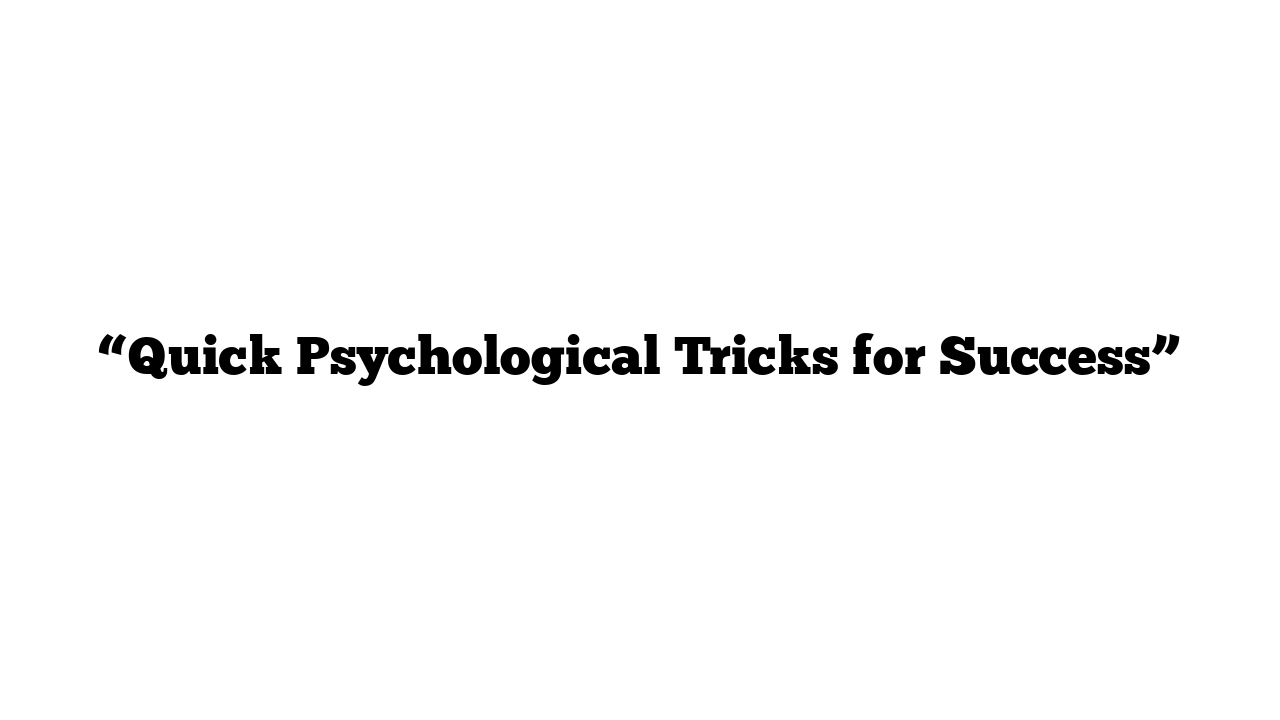“Psychological Hacks That Work”
Understanding the mind can help us navigate our daily interactions more effectively. Here are 17 psychological tricks that are backed by research and can make your life easier!
1. Memorizing the Bizarre
If you want someone to remember something, try framing it in a strange or unexpected way. Use a bizarre example or a weird mnemonic device. This technique taps into the bizarre effect, making information more memorable. The more unique the context, the better the chances of sticking in someone’s mind!
2. The Framing Effect
Did you know that the way information is presented can influence decisions? This is known as the framing effect. For example, a yogurt labeled as “98% fat-free” will likely be more appealing than one labeled “2% fat.” Emphasizing gains instead of losses can lead to different choices, even if the products are identical.
3. The Influence of Absolute Certainty
People are more likely to take action when they believe there is no risk involved. This is known as the certainty effect. To guide someone towards a better decision, introduce a realistic doubt. This method can help them reconsider risky choices.
4. Strategic Passivity
When expressing disappointment, it’s essential to choose your words wisely. Instead of saying, “You didn’t do this right,” try using passive voice: “This wasn’t done right.” This small change can convey your frustration without causing offense.
5. The Power of Multiple Options
If someone is struggling to express their feelings, provide them with two options. For example, you can ask if they are stressed about work or if something you did upset them. Giving options makes it easier for them to communicate their emotions.
6. The Von Restorff Effect
People remember things that stand out. This is called the Von Restorff effect. If you highlight an item on a list, it will likely get prioritized. Use this technique to draw attention to the most important tasks.
7. The Rhyme as Reason Effect
Using rhymes can improve memory retention. The rhyme as reason effect indicates that people find rhyming statements more credible and memorable. So, if you want to make a point, try to express it in rhyme!
8. Relieving Discomfort Under Pressure
When giving a presentation, having something to hold onto can alleviate discomfort. Whether it’s a clipboard or a water bottle, having a physical object can make you feel more relaxed and confident.
9. Communicating Value
Everyone wants to feel valued. In a professional environment, recognizing someone’s contributions can boost their morale and productivity. When people feel needed, they are more likely to put in extra effort.
10. Instant Bonding
To create an instant connection, repeat a person’s name during your conversation. This simple act shows that you are invested in them and can help establish a strong rapport.
11. The IKEA Effect
People tend to value things they’ve built themselves more than those they received as gifts. Involving others in a project can increase their investment and commitment to it. When they contribute, they take pride in the outcome.
12. Conditioning with Validation
When someone uses specific words or phrases, respond with positive body language, like nodding or smiling. This validation encourages them to continue using those expressions, fostering a more engaging conversation.
13. Calculated Bargaining
In negotiations, start by asking for more than you need. This tactic sets a high anchor point, making your actual request seem reasonable in comparison. When you lower your request, it feels like a concession, which can lead to successful negotiations.
14. Undermining Laziness
To motivate unproductive team members, break their tasks into smaller, manageable chunks. This approach can help them stay focused and prevent procrastination. Each small success will build momentum.
15. The Supportive Foundation
To get your opinions taken seriously, first validate the other person’s point of view. By showing that you are listening, you create a supportive environment where both parties feel heard and valued.
16. Motivational Expectations
Expressing high expectations for someone can significantly improve their performance. When people feel trusted and appreciated, their confidence and productivity increase.
17. The Modality Effect
When sharing important information, save it for the end of your presentation. The modality effect suggests that people remember information better when it is presented last. This technique maximizes retention, especially in verbal communication.
These psychological tricks can enhance your communication skills, strengthen relationships, and improve decision-making. As you practice these techniques, you may notice a positive change in your interactions. Remember, understanding psychology is a powerful tool in everyday life!
For more insights, check out these sources:
